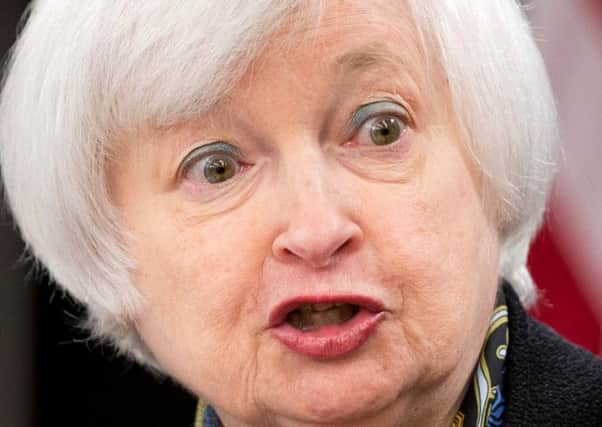Bill Jamieson: Global investors still distinctly unimpressed


Why should this be? What is causing investors to cash in their equity fund investments while the market has improved?
Better economic news from the US last week helped markets to take a more sanguine view of a summer rise in interest rates.
Advertisement
Hide AdAdvertisement
Hide AdJust ten days ago the hints from US Federal Reserve chairman Janet Yellen that rates could be raised as early as June were seen to dampen investor spirits.
Now, helped by notably improved US housing data, a rate rise would be seen as validation that the world’s biggest economy is at last returning to “normal” – or at least stepping away from the emergency rate regime that has prevailed for almost six years.
Also helping sentiment was a further recovery in the oil price. It broke above $50 a barrel at one point last week – the highest since last November before profit-taking set in on Friday.
The S&P last week enjoyed its biggest one-day gain since early March. And over here the FTSE 100 index had its best weekly gain since mid-April while the broader FTSE 250 Index was up more than 2 per cent.
Banks were in the van of the advance for much of the week, boosted by signs of a resurgence in mortgage lending and a court case that could blunt US regulators in their pursuit of Royal Bank of Scotland over alleged mis-selling of mortgage-backed securities.
Also helping sentiment was an improvement in UK consumer confidence in May, up from April’s 16-month low. And signs that voters were leaning towards a “Remain” vote in the EU referendum on 23 June also calmed market concerns over a political maelstrom at Westminster in the event of a vote for Brexit.
Even so, global investors remain distinctly unimpressed. Equity funds suffered their seventh consecutive week of outflows, with equity disinvestment hitting $9.2 billion in the week ending 25 May.
What is scaring investors? A notable feature is investor aversion to volatility. And the market tumbles in the early part of the year against a relatively benign economic backdrop shook confidence badly. Total outflows from equity funds for the year to date are now in excess of $100bn.
Advertisement
Hide AdAdvertisement
Hide AdAcross the channel European markets also enjoyed a broad advance, with the Eurofirst 300 Index gaining 3.5 per cent on the week. Sentiment here was helped by another last-minute deal over Greek debt – the clattering sound of a can being kicked yet further down the road still audible in the background.
But as the invaluable market watcher Citywire reported last week, European investment trusts are falling out of favour – again. The trusts have been regular features this year of the “cheap” list compiled by Numis we feature in Investment Trust Watch.
Share prices across the sector had mounted a recovery from the widest discounts to net asset value, but that has proved short-lived, with a renewed slump taking hold.
Notable among those on the retreat is JPMorgan European Income, where even a 3.9 per cent yield seems powerless to stop the discount stretching to 8.3 per cent, near its 12-month high of 9.7 per cent.
Even one of the best performers in the sector, Henderson Eurotrust, hasn’t escaped the damage. The shares are trading at a 5.6 per cent discount to NAV, close to its 6.3 per cent 12-month high. And while not making this week’s “cheap” list, shares in the best performing trust in the sector, Jupiter European Opportunities, are still trading well below their normal premium at a 3.9 per cent discount to NAV.
Why is this? It is partly due, says Citywire, to the sluggish performance of European shares since the turn of the year, which are up only marginally in pound terms, thanks largely to a rally in the euro.
That has left many of the investors who crowded into European funds last year disappointed. Figures from the Investment Association show that European open-ended funds were by far the most popular with investors last year, attracting a net £4.4bn of assets as the European central Bank unleashed its quantitative easing programme.
More recently, the tables have turned, with a net £156m withdrawn in February and March. Given the discounts on European investment trusts, it appears a similar sell-off is weighing. And after such a roller coaster performance, it will take more than a good week in markets for investors to start buying.